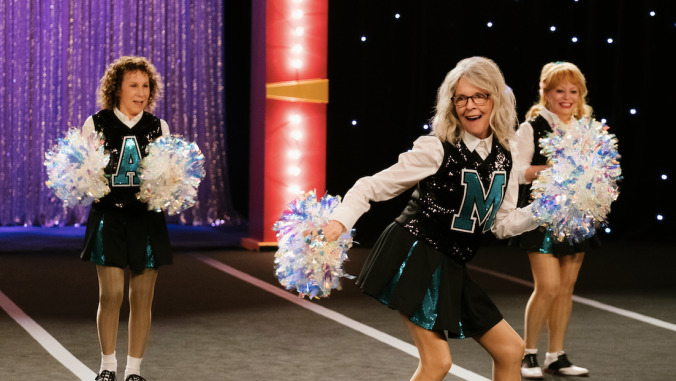You can cheer for Diane Keaton and Jacki Weaver, and still see that Poms is a treacly dud


When Martha (Diane Keaton) walks into her new home in an upscale, suffocating retirement community, she’s dragging a suitcase and carrying a worn cardboard box. Everything else has been sold, or given away. Yet there’s a lamp on a table near the door, and a basket awaiting her keys; a gleaming kitchen; a great beige sofa that could swallow one whole. There are also picture frames, already tilted at jaunty angles. They’re empty. This is a place meant to offer ease and simplicity, a plug-and-play home for a person who’s left mostly with memories. That’s not supposition: The community’s slogan is, “Have the time of your life for the rest of your life,” and as Martha tells its overbearing welcoming committee, she’s only here because she needs a place to die.
The unlikely narrative feature debut of documentarian Zara Hayes, who’s also credited with the film’s story (alongside screenwriter Shane Atkinson), Poms opens on Martha running her own estate sale in an alley, grimly bargaining with strangers. At its core, that’s the movie. Yet Poms seems to do its best to make all concerned forget that death sits in every corner, a constant but not menacing presence. It’s as though a focus group somewhere read the synopsis “A dying woman founds an all-seniors cheerleading squad,” zoomed in on the cheerleading, and brainstormed the rest of the story, tossing in mean teens, a grandson who can’t drive, and a judgy Southern belle, then dotting it with don’t-you-just-hate-it-whens before calling it a day. The cognitive dissonance can be oddly compelling—a fortunate thing, as this imagined focus group didn’t seem to bother with characters, save for two.
The exceptions prove the rule. Keaton benefits from her position at the center of the story. We witness her resignation when she moves into that pristine, pre-fitted space; the odd moment of solitary, silent pain or fear; her profound irritation when the people she meets insist on treating her arrival like a beginning and not an end. That last part is certainly true of Sheryl, who the great Jacki Weaver seems to pull out of sketch territory and into a fully-rendered character through sheer force of will. Seeing Keaton in a weary, somewhat cynical mode is bracing; no matter how bubbly Martha gets, it’s impossible to forget her haggling in that alley. Yet Sheryl, through persistence, affability, and narrative convenience, somehow wears her down. A casual chat about the cheerleading uniform in that one lonely box leads to the pair founding a cheerleading club. (Hayes and Atkinson took inspiration from the Sun City Poms.)
It’s treacly, can-do stuff, yet when Hayes’ camera settles down and, workmanlike, trains its gaze on that friendship—which, while initially contrived, cements into something much more compelling in the hands of these fine actors—Poms begins to feel like a story, not an elevator pitch. Unfortunately, that camera darts away with some frequency. When it moves to the other women on the team, the insubstantial nature of the characters becomes painfully evident. All are defined by either a thing they can do or a person they know. There’s the splits lady (Ginny MacColl) and the aerobics lady (Carol Sutton) on one side; on the other, Rhea Perlman’s Alice, who has a terrible husband, and Pam Grier’s Olive, who had to take tango lessons or get divorced. At best, a character checks both boxes, as is the case with Helen (the typically fascinating Phyllis Somerville), who’s both the baton-twirling one and the one with the controlling, misogynist son (David Maldonado). An embarrassment of riches, that.
That last example is particularly galling, and it underlines what’s so frustrating about Poms. The message here would seem to be that life doesn’t simply end when you near 70; dreams can be chased and new pleasures discovered at any age. Yet by showing such disinterest in painting these characters as anything but cute old ladies, the film treats them in a manner nearly as reductive as its ostensible villains, who see Martha and company as doddering old biddies intent on injuring or humiliating themselves. Poms, on the other hand, sees them as adorable old biddies intent on bringing it on. Together, Weaver and Keaton sometimes manage to tease out the movie inside the movie, the one drawn to the connections between death and joy, youthfulness and mortality. Mostly, though, Poms just wants you to cheer.